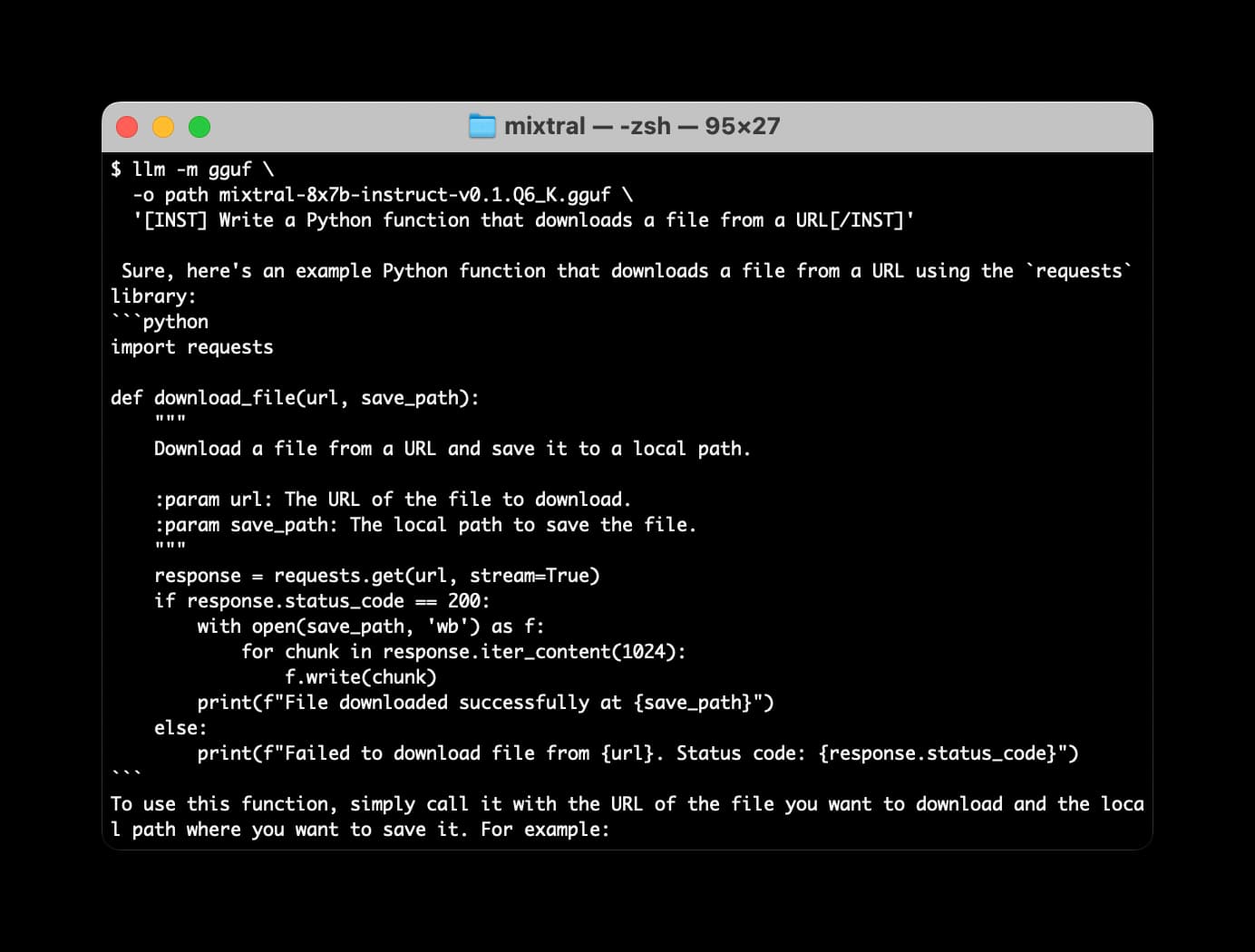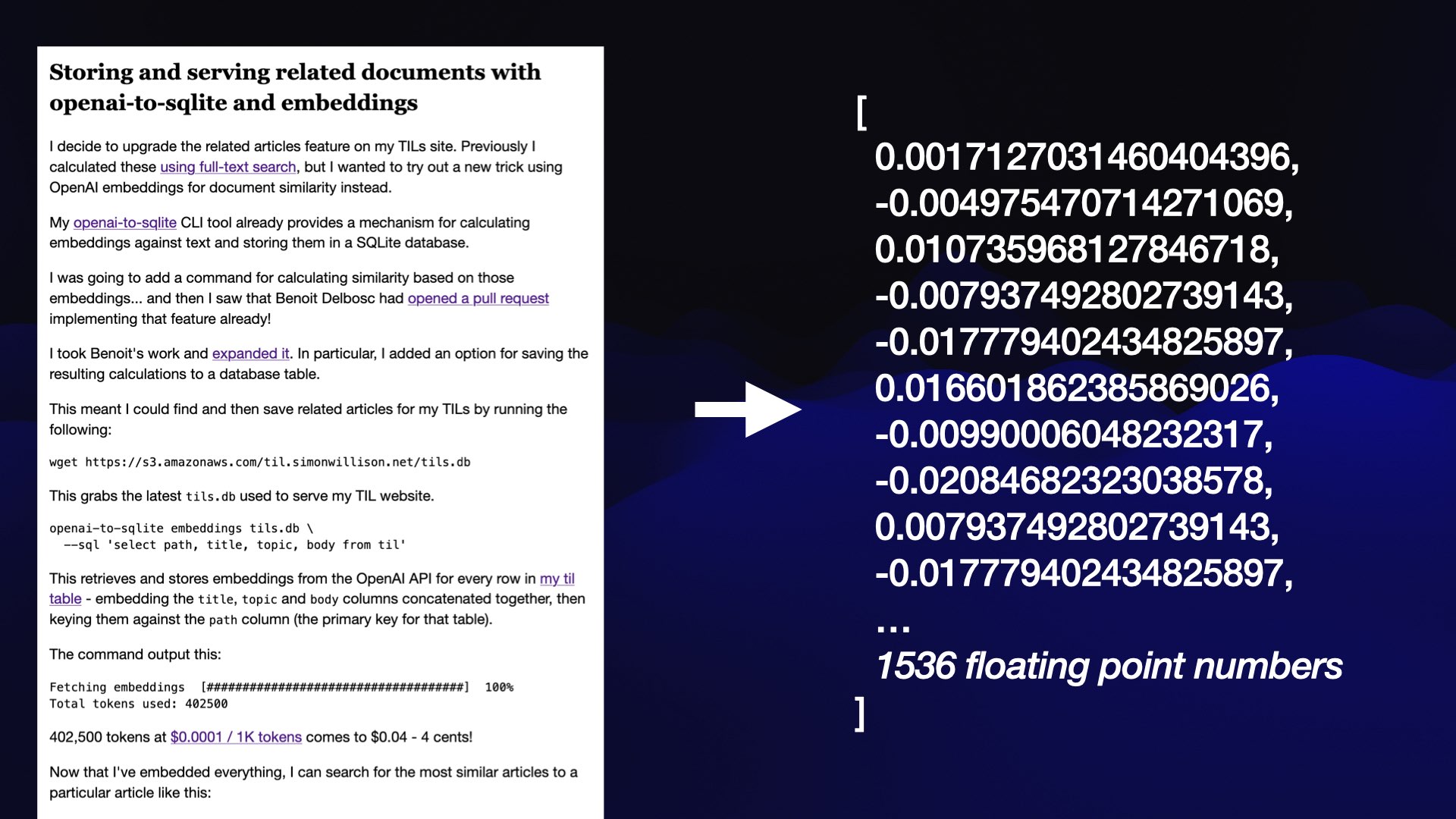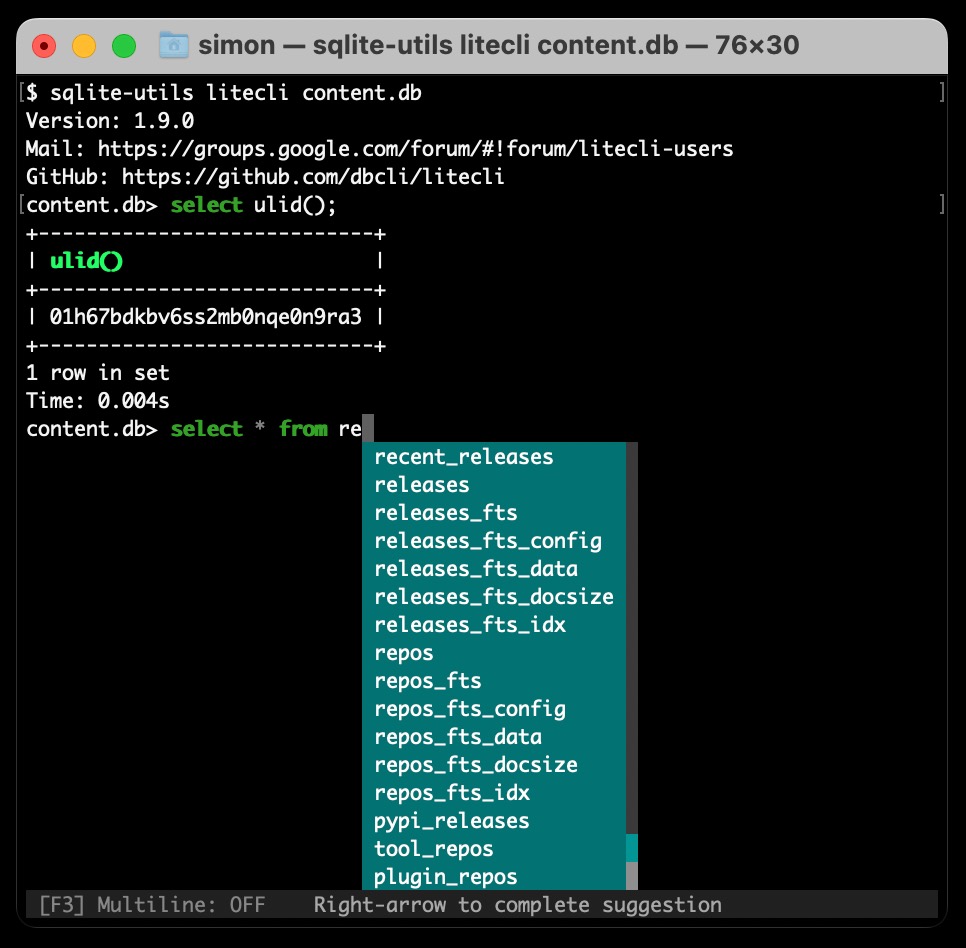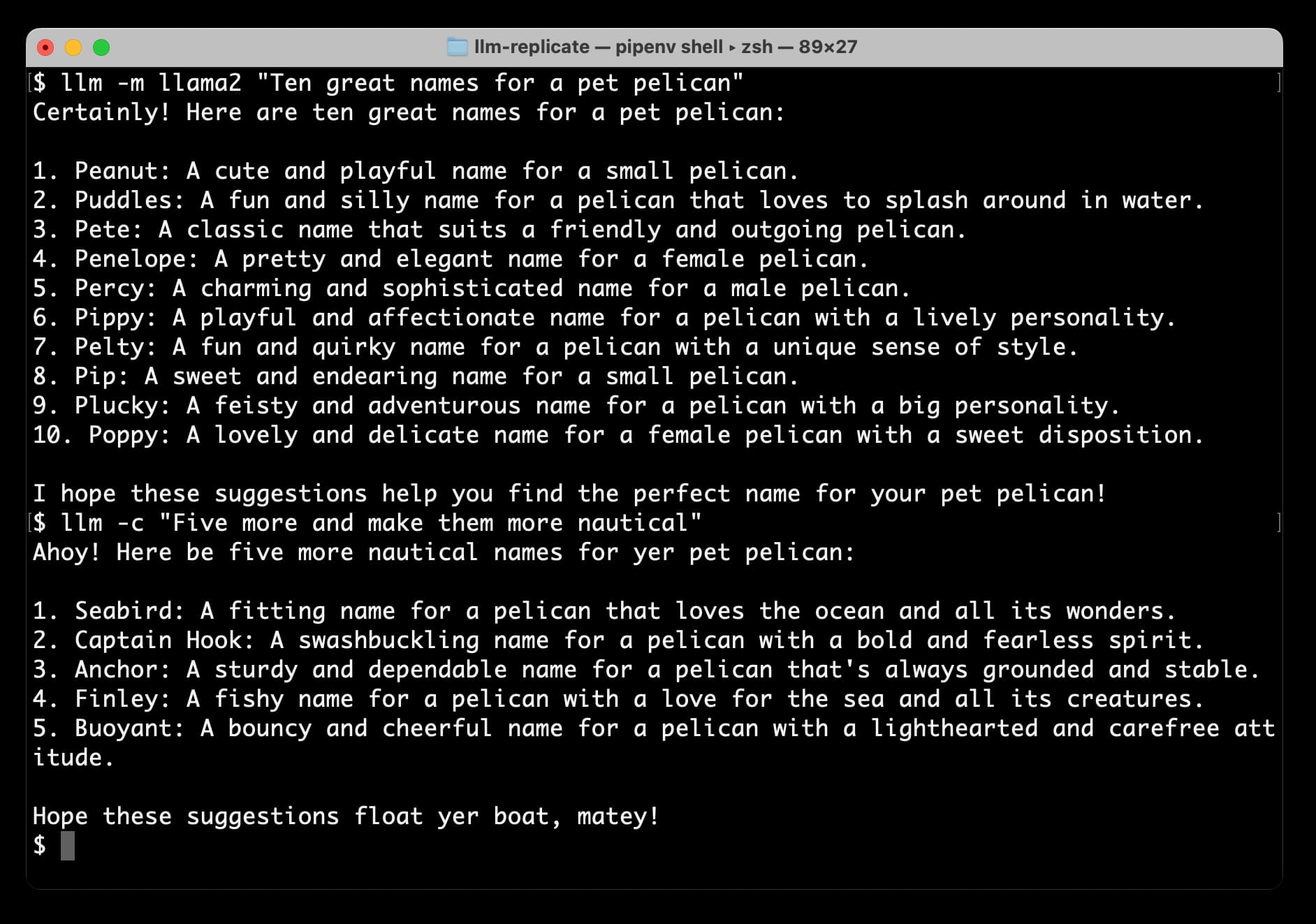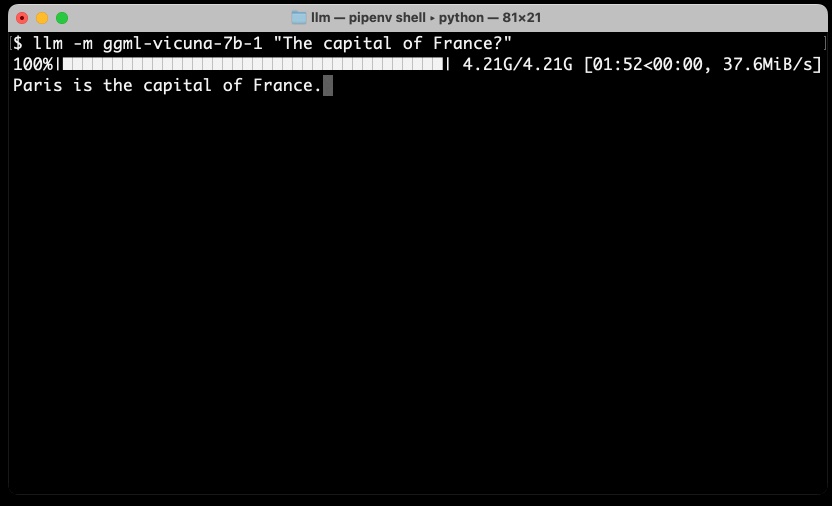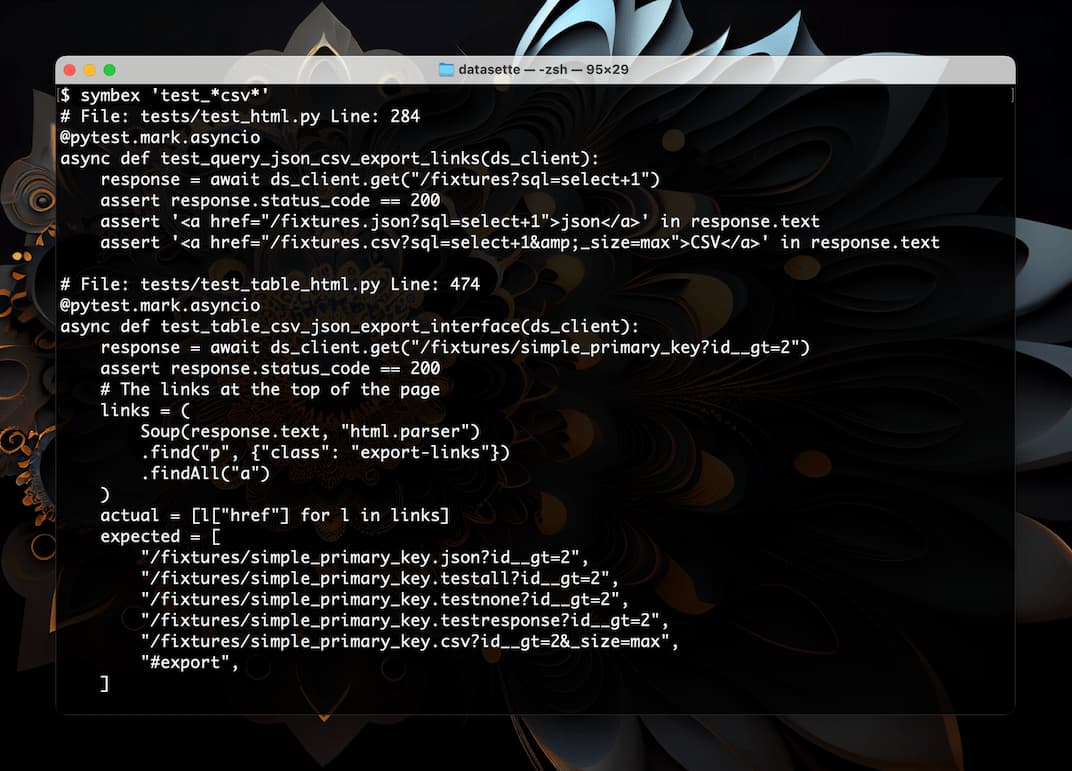108 posts tagged “cli”
Command-line interface tools and how to build them.
2024
tantivy-cli (via) I tried out this Rust based search engine today and I was very impressed.
Tantivy is the core project - it's an open source (MIT) Rust library that implements Lucene-style full text search, with a very full set of features: BM25 ranking, faceted search, range queries, incremental indexing etc.
tantivy-cli offers a CLI wrapper around the Rust library. It's not actually as full-featured as I hoped: it's intended as more of a demo than a full exposure of the library's features. The JSON API server it runs can only be used to run simple keyword or phrase searches for example, no faceting or filtering.
Tantivy's performance is fantastic. I was able to index the entire contents of my link blog in a fraction of a second.
I found this post from 2017 where Tantivy creator Paul Masurel described the initial architecture of his new search side-project that he created to help him learn Rust. Paul went on to found Quickwit, an impressive looking analytics platform that uses Tantivy as one of its core components.
The Python bindings for Tantivy look well maintained, wrapping the Rust library using maturin. Those are probably the best way for a developer like myself to really start exploring what it can do.
Also notable: the Hacker News thread has dozens of posts from happy Tantivy users reporting successful use on their projects.
Tips on Adding JSON Output to Your CLI App
(via)
Kelly Brazil - also the author of jc, the neat CLI tool that converts the output of common Unix utilities such as dig into JSON - provides some useful do's and don'ts for adding JSON output as an option to a command-line tool.
Kelly recommends defaulting to arrays of flat objects - or newline-delimited objects - and suggests including an "unbuffer" option for streaming tools that discourages the OS from buffering output that is being sent through a pipe.
A POI Database in One Line (via) Overture maps offer an extraordinarily useful freely licensed databases of POI (point of interest) listings, principally derived from partners such as Facebook and including restaurants, shops, museums and other locations from all around the world.
Their new "overturemaps" Python CLI utility makes it easy to quickly pull subsets of their data... but requires you to provide a bounding box to do so.
Drew Breunig came up with this delightful recipe for fetching data using LLM and gpt-3.5-turbo to fill in those bounding boxes:
overturemaps download --bbox=$(llm 'Give me a bounding box for Alameda, California expressed as only four numbers delineated by commas, with no spaces, longitude preceding latitude.') -f geojsonseq --type=place | geojson-to-sqlite alameda.db places - --nl --pk=id
Use an llm to automagically generate meaningful git commit messages. Neat, thoroughly documented recipe by Harper Reed using my LLM CLI tool as part of a scheme for if you’re feeling too lazy to write a commit message—it uses a prepare-commit-msg Git hook which runs any time you commit without a message and pipes your changes to a model along with a custom system prompt.
Building files-to-prompt entirely using Claude 3 Opus
files-to-prompt is a new tool I built to help me pipe several files at once into prompts to LLMs such as Claude and GPT-4.
[... 3,235 words]textract-cli. This is my other OCR project from yesterday: I built the thinnest possible CLI wrapper around Amazon Textract, out of frustration at how hard that tool is to use on an ad-hoc basis.
It only works with JPEGs and PNGs (not PDFs) up to 5MB in size, reflecting limitations in Textract’s synchronous API: it can handle PDFs amazingly well but you have to upload them to an S3 bucket yet and I decided to keep the scope tight for the first version of this tool.
Assuming you’ve configured AWS credentials already, this is all you need to know:
pipx install textract-cli
textract-cli image.jpeg > output.txt
Semgrep: AutoFixes using LLMs (via) semgrep is a really neat tool for semantic grep against source code—you can give it a pattern like “log.$A(...)” to match all forms of log.warning(...) / log.error(...) etc.
Ilia Choly built semgrepx— xargs for semgrep—and here shows how it can be used along with my llm CLI tool to execute code replacements against matches by passing them through an LLM such as Claude 3 Opus.
mapshaper.org (via) It turns out the mapshaper CLI tool for manipulating geospatial data—including converting shapefiles to GeoJSON and back again—also has a web UI that runs the conversions entirely in your browser. If you need to convert between those (and other) formats it’s hard to imagine a more convenient option.
DuckDB as the New jq (via) The DuckDB CLI tool can query JSON files directly, making it a surprisingly effective replacement for jq. Paul Gross demonstrates the following query:
select license->>'key' as license, count(*) from 'repos.json' group by 1
repos.json contains an array of {"license": {"key": "apache-2.0"}..} objects. This example query shows counts for each of those licenses.
dclient 0.3. dclient is my CLI utility for working with remote Datasette instances—in particular for authenticating with them and then running both read-only SQL queries and inserting data using the new Datasette write JSON API. I just picked up work on the project again after a six month gap—the insert command can now be used to constantly stream data directly to hosted Datasette instances such as Datasette Cloud.
datasette-studio. I've been thinking for a while that it might be interesting to have a version of Datasette that comes bundled with a set of useful plugins, aimed at expanding Datasette's default functionality to cover things like importing data and editing schemas.
This morning I built the very first experimental preview of what that could look like. Install it using pipx:
pipx install datasette-studio
I recommend pipx because it will ensure datasette-studio gets its own isolated environment, independent of any other Datasette installations you might have.
Now running datasette-studio instead of datasette will get you the version with the bundled plugins.
The implementation of this is fun - it's a single pyproject.toml file defining the dependencies and setting up the datasette-studio CLI hook, which is enough to provide the full set of functionality.
Is this a good idea? I don't know yet, but it's certainly an interesting initial experiment.
wddbfs – Mount a sqlite database as a filesystem. Ingenious hack from Adam Obeng. Install this Python tool and run it against a SQLite database:
wddbfs --anonymous --db-path path/to/content.db
Then tell the macOS Finder to connect to Go -> Connect to Server -> http://127.0.0.1:8080/ (connect as guest) - connecting via WebDAV.
/Volumes/127.0.0.1/content.db will now be a folder full of CSV, TSV, JSON and JSONL files - one of each format for every table.
This means you can open data from SQLite directly in any application that supports that format, and you can even run CLI commands such as grep, ripgrep or jq directly against the data!
Adam used WebDAV because "Despite how clunky it is, this seems to be the best way to implement a filesystem given that getting FUSE support is not straightforward". What a neat trick.
llmc.sh (via) Adam Montgomery wrote this a neat wrapper around my LLM CLI utility: it adds a “llmc” zsh function which you can ask for shell commands (llmc ’use ripgrep to find files matching otter’) which outputs the command, an explanation of the command and then copies the command to your clipboard for you to paste and execute if it looks like the right thing.
2023
Many options for running Mistral models in your terminal using LLM
Mistral AI is the most exciting AI research lab at the moment. They’ve now released two extremely powerful smaller Large Language Models under an Apache 2 license, and have a third much larger one that’s available via their API.
[... 2,063 words]ast-grep (via) There are a lot of interesting things about this year-old project.
sg (an alias for ast-grep) is a CLI tool for running AST-based searches against code, built in Rust on top of the Tree-sitter parsing library. You can run commands like this:
sg -p ’await await_me_maybe($ARG)’ datasette --lang python
To search the datasette directory for code that matches the search pattern, in a syntax-aware way.
It works across 19 different languages, and can handle search-and-replace too, so it can work as a powerful syntax-aware refactoring tool.
My favourite detail is how it’s packaged. You can install the CLI utility using Homebrew, Cargo, npm or pip/pipx—each of which will give you a CLI tool you can start running. On top of that it provides API bindings for Rust, JavaScript and Python!
ospeak: a CLI tool for speaking text in the terminal via OpenAI
I attended OpenAI DevDay today, the first OpenAI developer conference. It was a lot. They released a bewildering array of new API tools, which I’m just beginning to wade my way through fully understanding.
[... 1,109 words]Execute Jina embeddings with a CLI using llm-embed-jina
Berlin-based Jina AI just released a new family of embedding models, boasting that they are the “world’s first open-source 8K text embedding model” and that they rival OpenAI’s text-embedding-ada-002 in quality.
New sqlite3 CLI tool in Python 3.12. The newly released Python 3.12 includes a SQLite shell, which you can open using “python -m sqlite3”—handy for when you’re using a machine that has Python installed but no sqlite3 binary.
I installed Python 3.12 for macOS using the official installer from Python.org and now “/usr/local/bin/python3 -m sqlite3” gives me a SQLite 3.41.1 shell—a pleasantly recent version from March 2023 (the latest SQLite is 3.43.1, released in September).
Things I’ve learned about building CLI tools in Python
I build a lot of command-line tools in Python. It’s become my favorite way of quickly turning a piece of code into something I can use myself and package up for other people to use too.
[... 1,235 words]Build an image search engine with llm-clip, chat with models with llm chat
LLM is my combination CLI tool and Python library for working with Large Language Models. I just released LLM 0.10 with two significant new features: embedding support for binary files and the llm chat command.
promptfoo: How to benchmark Llama2 Uncensored vs. GPT-3.5 on your own inputs. promptfoo is a CLI and library for “evaluating LLM output quality”. This tutorial in their documentation about using it to compare Llama 2 to gpt-3.5-turbo is a good illustration of how it works: it uses YAML files to configure the prompts, and more YAML to define assertions such as “not-icontains: AI language model”.
LLM now provides tools for working with embeddings
LLM is my Python library and command-line tool for working with language models. I just released LLM 0.9 with a new set of features that extend LLM to provide tools for working with embeddings.
[... 3,521 words]Dependency Management Data (via) This is a really neat CLI tool by Jamie Tanna, built using Go and SQLite but with a feature that embeds a Datasette instance (literally shelling out to start the process running from within the Go application) to provide an interface for browsing the resulting database.
It addresses the challenge of keeping track of the dependencies used across an organization, by gathering them into a SQLite database from a variety of different sources—currently Dependabot, Renovate and some custom AWS tooling.
The “Example” page links to a live Datasette instance and includes video demos of the tool in action.
Weeknotes: Plugins for LLM, sqlite-utils and Datasette
The principle theme for the past few weeks has been plugins.
[... 1,203 words]textual-paint (via) Isaiah Odhner built a full working clone of MS Paint that runs entirely in the terminal, using Textual and Python. It’s worth trying this out to get a feel for quite how much you can get done with a CLI app these days—“pipx install textual-paint” worked for me.
Accessing Llama 2 from the command-line with the llm-replicate plugin
The big news today is Llama 2, the new openly licensed Large Language Model from Meta AI. It’s a really big deal:
[... 1,206 words]My LLM CLI tool now supports self-hosted language models via plugins
LLM is my command-line utility and Python library for working with large language models such as GPT-4. I just released version 0.5 with a huge new feature: you can now install plugins that add support for additional models to the tool, including models that can run on your own hardware.
[... 1,656 words]Symbex: search Python code for functions and classes, then pipe them into a LLM
I just released a new Python CLI tool called Symbex. It’s a search tool, loosely inspired by ripgrep, which lets you search Python code for functions and classes by name or wildcard, then see just the source code of those matching entities.
[... 1,183 words]LLM 0.4. I released a major update to my LLM CLI tool today—version 0.4, which adds conversation mode and prompt templates so you can store and re-use interesting prompts, plus a whole bunch of other large and small improvements.
I also released 0.4.1 with some minor fixes and the ability to install the tool using Hombrew: brew install simonw/llm/llm
Trogon (via) The latest project from the Textualize/Rich crew, Trogon provides a Python decorator—@tui—which, when applied to a Click CLI application, adds a new interactive TUI mode which introspects the available subcommands and their options and creates a full Text User Interface—with keyboard and mouse support—for assembling invocations of those various commands.
I just shipped sqlite-utils 3.32 with support for this—it uses an optional dependency, so you’ll need to run “sqlite-utils install trogon” and then “sqlite-utils tui” to try it out.

